World stock markets slid yesterday, with Asia taking the heaviest hit, as investors worried about signs of a sharp global economic slowdown.
Traders shrugged off news that an investigation found no evidence of collusion between US President Donald Trump’s election campaign and Russia.
The pound gave up earlier gains to trade lower against both the euro and the dollar after Prime Minister Theresa May admitted yesterday she had still not secured the votes needed to get her Brexit deal through parliament, raising again the prospect that Britain could crash out of the European Union in two weeks’ time.
Dealers have been spooked by growing evidence of a slowdown, after a broad-based rally since the start of the year that was built on hopes for China-US trade talks and a more dovish Federal Reserve.
“Concerns over the health of the global economy heat up at a rapid pace,” said analyst Jameel Ahmad at traders FXTM.
In Europe key stock markets were lower at the close. London’s FTSE 100 was down 0.4% at 7,177.58 points at close; Frankfurt’s DAX 30 fell 0.2% at 11,346.65, while Paris’ CAC 40 dropped 0.2% at 5,260.64.
Wall Street also got off to a softer start, but then edged into slightly positive territory, helping Europe off its worst levels in time for the closing bell.
Minutes later, however, the Dow Jones index was back in the red.
Eurozone losses were also capped by the closely-watched Ifo index that showed recovering confidence among Germany’s business leaders in March after six months of decline.
But earlier, Tokyo’s main stocks index was hammered 3.0%, while Hong Kong and Shanghai both dived 2%, as concerns festered also over a possible recession in the US, dealers said.
“Despite a miserable session for Asia, European markets are managing to avoid heavy losses,” noted IG analyst Chris Beauchamp.
“The risk-off mood at the end of last week seemed dramatic, and was perhaps justified given the sudden shift in the economic outlook, but a better reading from the German Ifo index has provided some reason for optimism,” he added.
US and European equities had tumbled on Friday as the yield on 10-year Treasury bonds fell below those for three-month notes — the first time this had happened since before the global financial crisis.
This so-called inverted yield curve shows investors are more willing to buy long-term debt — usually considered higher risk — as they consider the short-term outlook more risky.
“This development will psychologically encourage further anxiety and rocket fears that the global economy is heading for another downturn, if recent economic releases across the globe have not already provided indications that the downturn has arrived,” added analyst Ahmad.
The yield curve is closely watched since it has inverted prior to recessions in recent decades.

A close-up of a mixture of British five, ten and twenty pound notes seen in London (file).
